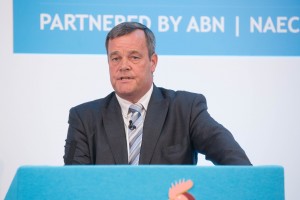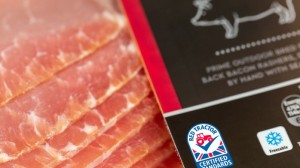As the country’s biggest pig marketing group, Thames Valley Cambac has a key role to play in the pig industry’s future. In the latest issue of Pig World, TVC’s Phil Woodall told ALISTAIR DRIVER why he believes things are gradually changing for the better within the supply chain
UK pig producers currently have a unique opportunity to secure a better deal from the supply chain in both the short- and longer-term, according to Phil Woodall, general manager at Thames Valley Cambac.
A combination of a market, for once, very much in their favour and a drive for reform coming from Government, but also within parts of the supply chain, means there will never be a better time to put the sector on a more secure footing, he believes. There is, however, still a long road ahead to get there.
TVC held its AGM in Exeter in early April and during his update, Mr Woodall painted a healthy picture of an organisation that has grown from humble origins in 1975 to become the biggest pig marketing group in the country, marketing close to 3 million pigs in 2022.
It is, therefore, uniquely positioned to gauge the mood of producers, as well as the big processors it deals with and, indirectly, the retail sector.
Supply chain review

Mr Woodall welcomed the principles outlined by Defra in its summary of responses to the pig supply chain review, but stressed that full judgement needs to be reserved until more detail is fleshed out.
TVC fed strongly into the consultation, and he set out some of the principles that must be embedded into any future reforms of contractual practice, including flexibility and independent arbitration. The design of new contracts will, clearly, need to be thought through very carefully.
“Ultimately, our producers want a very rigorous contract, but they to need to be careful what they wish for. Whatever rigidity applies to protect the producer, will also apply on the other,” he said.
“There has to be some flexibility built in. When it comes to pig numbers, I think plus or minus 5% over 13 weeks would be reasonable.
“The backlog showed that a lot of contracts were not good enough, but we also had some robust contracts in place. However, processors were hiding behind Brexit and a lack of staff, but this clearly was not a case of force majeure.
“The problem was that, even where we had robust contracts, there was no consequence for non-adherence. So, we will need an independent regulatory body – there has to be a consequence for non-adherence to stop people abusing contracts.”
While Defra’s intervention is welcome, everyone knows that meaningful reform can only ultimately be delivered by the key players in the chain re-evaluating how they do things – and communicating with each other. Mr Woodall stressed that, in some cases, this is already happening, with retailers, through processors, currently working with TVC on new contracts.
New contracts
 TVC has been engaged in detailed talks with a processor about a new contract for producers with a specific retailer.
TVC has been engaged in detailed talks with a processor about a new contract for producers with a specific retailer.
Mr Woodall explained that, under this, 50% of the price is based on ‘cost of production-plus’, with the other half based on a retrospective SPP over 13 weeks. The COP element is an average, using a model, with the supermarket making some decisions on the timing of raw material purchases. There is a review period for each aspect of the model.
“It is about trying to achieve stability for buyer and seller,” he explained. “It will be slow going up and slow coming down. I think most producers now would forfeit the potential of some real upsides to avoid the real risk of another very big downside,” he said.
Mr Woodall acknowledged that the most difficult aspect of the negotiation was the ‘plus in the cost-plus’. “It has got to more than cover producers’ costs,” he added. “Retailers ask what it should be. My stock answer is: “Well, what’s your expectation for return on investment and we will work for 1% less.
“I think, slowly but surely, some retailers are starting to see there needs to be a sensible return on investment for producers.”
There is a small group of producers who will have a proportion of their weekly kill, for example 200 pigs a week, on this contract. These will be the first 200 every week, Mr Woodall explained.
There has been ‘limited discussion’ on introducing points of difference, but nothing has been agreed yet and, at the moment, in order to avoid the additional costs of segregation, the whole of the pig from these producers does not necessarily go to the retailer.
“It is not a segregated dedicated supply arrangement in that respect, but the retailer is happy to be supporting Red Tractor producers,” Mr Woodall said.
While not every retailer is thinking along these lines, similar discussions are taking place with others, Mr Woodall said, reflecting a real acceptance that things need to change.
“Retailers understand that their supply of pork is endangered, and they need to take action. There is some scepticism that they are only doing this because pigs are short at the moment, but, in reality, they are looking at three- to five-year timescales and are in it for the long-term,” he said.
Processors, similarly, want more stability and to avoid the huge swings experienced over the past two years, while pig producers who previously might have benefited enough from the ups to justify the downs were now seeking a steadier ride.
Role of marketing groups
One of the knock-on effects of the pig crisis has been the sad demise of many independent producers, with much of the slack taken up by the big integrators looking to build their production base.
This has prompted much discussion about the best way forward for the independent sector, including the role of marketing groups. So, should independent producers be looking to increase their negotiating power through bigger, stronger marketing groups?
“I don’t think it’s necessarily about having fewer, bigger groups,” Mr Woodall said. “In some ways our biggest competitors aren’t the other marketing groups, but the producers who sell direct. When producers get enticed away, that can undermine the rest – a case of divide and conquer.
“I am not saying we hold all the answers, but people who sell pigs through us benefit from our relations with the big players and our ability to get the best deal over the long-term.
“Pig producers are dealing with so many things at once, whereas we are living and breathing marketing every day. It’s what we do.
“For me, it’s the same principle as using a nutrition specialist to buy your ingredients or a vet to look after your pigs’ health.”
While TVC has lost around 20 members over the past year – it still has just over 100 – some larger producers have ‘come into the fold, as they appreciate we have a different dialogue with processors’, he added.
Despite everything that has happened, Mr Woodall is confident that we are heading towards a better place for independent pig producers.
“In the 40-odd years I have been involved in trading pigs, I’ve never seen it as bad as over the last two years.
“As we come out of this and we’ve got the price going up and costs coming down, my fear is that producers have short memories, and the danger is they will sit back and relax.
“But if I could get one message out to producers, whether going direct or through a marketing group, it is to insist on getting two or three clauses into contracts now, particularly for non-adherence.
“Processors aren’t going to do it voluntarily, but at the moment, for every three pigs out there, there are four homes and, if processors aren’t prepared to change, then you can move to someone who will.
“We have a window of opportunity – we have to make it stick,” he said. “The only way we’re going to get there is if the supply chain is united and everybody is asking in unison.”
But he stressed that there is no quick fix and urged the Government, as it implements its reforms, to ensure it doesn’t focus exclusively on the processor side of things.
“The power lies with the retailers and often, when producers feel they have been mistreated by a processor, that is down to the pressure placed on them from above.
“And if the Government sees itself as the conscience of society and wants to protect our animal welfare standards, they should be legislating retailers not to buy from systems that don’t comply with our standards.”
Warm tribute to Charlie Allen, after 32 years as TVC chair

Veteran pig producer Charlie Allen has stepped down as chairman of Thames Valley Cambac, after nearly 50 years with the business, including 32 as its chair.
Charlie, who started farming in 1971, was a founding member of TVC in 1975, before being appointed to the board in 1982 and going on to become its chairman in 1991.
TVC’s AGM in Exeter in April was his final act in the role before handing over the reins to Yorkshire producer Rob Beckett.
At a dinner to mark the event, Northamptonshire pig farmer Robin Thompson delivered a warm tribute to ‘our silver-haired monarch of TVC’, outlining how he had overseen its rise from small beginnings to the country’s biggest pig marketing group today with his ‘keen enthusiasm for the benefits of group marketing’.
“Charlie can take pride a job well done,” he said.
Charlie, whose family business now has more than 5,000 sows, said it had been a ‘huge privilege’ to be a member of TVC, having been one of 11 pig farmers ‘sat around a table at the very start’.
“The rise from trading just under 60,000 pigs a year to more than 3 million today has taken some achieving,” he said. “To see the huge progress over these years to the business we have today fills me with enormous pride. The support of our membership has been paramount to that success, and I thank you all.”
- Main image: Phil Woodall and Charlie Allen at TVC’s AGM.




